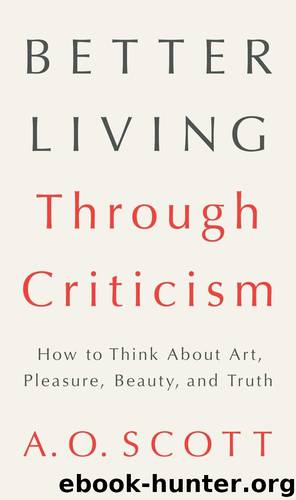Better Living Through Criticism: How to Think about Art, Pleasure, Beauty, and Truth by A. O. Scott

Author:A. O. Scott [Scott, A. O.]
Language: eng
Format: epub, azw3, mobi
Publisher: Penguin Publishing Group
Published: 2016-02-09T07:00:00+00:00
In a cold but stuffy bed-sitting room littered with cigarette ends and half-empty cups of tea, a man in a moth-eaten dressing-gown sits at a rickety table, trying to find room for his typewriter among the piles of dusty papers that surround it.
This man, who hovers between the merely pathetic and the utterly abject—“If things are normal with him he will be suffering from malnutrition, but if he has recently had a lucky streak he will be suffering from a hangover”—is the nameless, archetypal subject of George Orwell’s “Confessions of a Book Reviewer,” a brutally frank and funny tour of the squalid margins of the literary profession. This caricature of a prematurely aged fellow with varicose veins, poor hygiene, unpaid debts, and a welter of distractions is also a tongue-in-cheek self-portrait, since Orwell was, at the time of its publication in 1946, one of England’s most industrious reviewers. And also one of its most candidly self-flagellating writers: in that same year, he published “Why I Write,” a stirring defense of the life of letters that also dumps cold water on romantic myths of that life. “All writers are vain, selfish and lazy,” Orwell declares in that essay, but the critic is a special case. In “Confessions,” he grants that “every writer . . . is rather that kind of person”—meaning a grasping, slovenly scrounger—but goes on to note that “the prolonged, indiscriminate reviewing of books is a quite exceptionally thankless, irritating and exhausting job.” (The only thing lower, in Orwell’s blunt estimation, is film criticism.)
More than that, book reviewing is a pointless enterprise, a drain not only on the spirit of the critic, but also on the vitality of the culture. The hapless critic is caught in a self-undermining spiral, whereby his ostensible goal—to celebrate the good and condemn the bad—is thwarted by the sheer mass of mediocrity with which he must contend. The public, understandably enough, wants “some kind of guide to the books they are asked to read, and they want some kind of evaluation. But as soon as values are mentioned, standards collapse.” In other words, the doling out of consumer advice inevitably drags the act of discrimination into the swamp of relativism. The good enough—for this week’s paycheck or tomorrow’s edition—becomes the enemy of the best, and the chances of discerning and communicating the lasting merit of a given book crumble under the weight of superfluous opinion.
Orwell is clearly exaggerating for effect, and his view seems unduly fatalistic. Surely there is some utility, even some virtue, in the endless work of sorting wheat from chaff. Someone needs to take care of that, to help the rest of us figure out where to direct our attention and how to spend our money. The question that reverberates in Orwell’s pages—and echoes into the present, with a few alterations of detail—is less about the labor of criticism than about the suitability of the critic for the task. Why should we trust this guy, of all people? We can update
Download
Better Living Through Criticism: How to Think about Art, Pleasure, Beauty, and Truth by A. O. Scott.azw3
Better Living Through Criticism: How to Think about Art, Pleasure, Beauty, and Truth by A. O. Scott.mobi
This site does not store any files on its server. We only index and link to content provided by other sites. Please contact the content providers to delete copyright contents if any and email us, we'll remove relevant links or contents immediately.
| Anthropology | Archaeology |
| Philosophy | Politics & Government |
| Social Sciences | Sociology |
| Women's Studies |
The remains of the day by Kazuo Ishiguro(8977)
Tools of Titans by Timothy Ferriss(8365)
Giovanni's Room by James Baldwin(7330)
The Black Swan by Nassim Nicholas Taleb(7109)
Inner Engineering: A Yogi's Guide to Joy by Sadhguru(6785)
The Way of Zen by Alan W. Watts(6601)
Asking the Right Questions: A Guide to Critical Thinking by M. Neil Browne & Stuart M. Keeley(5759)
The Power of Now: A Guide to Spiritual Enlightenment by Eckhart Tolle(5754)
The Six Wives Of Henry VIII (WOMEN IN HISTORY) by Fraser Antonia(5498)
Astrophysics for People in a Hurry by Neil DeGrasse Tyson(5182)
Housekeeping by Marilynne Robinson(4436)
12 Rules for Life by Jordan B. Peterson(4299)
Double Down (Diary of a Wimpy Kid Book 11) by Jeff Kinney(4261)
Ikigai by Héctor García & Francesc Miralles(4247)
The Ethical Slut by Janet W. Hardy(4242)
Skin in the Game by Nassim Nicholas Taleb(4239)
The Art of Happiness by The Dalai Lama(4125)
Skin in the Game: Hidden Asymmetries in Daily Life by Nassim Nicholas Taleb(3991)
Walking by Henry David Thoreau(3953)
